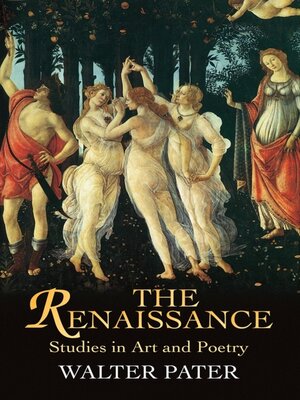
Sign up to save your library
With an OverDrive account, you can save your favorite libraries for at-a-glance information about availability. Find out more about OverDrive accounts.
Find this title in Libby, the library reading app by OverDrive.



Search for a digital library with this title
Title found at these libraries:
| Library Name | Distance |
|---|---|
| Loading... |
"The golden book of spirit and sense, the holy writ of beauty." — Oscar Wilde Published to equal parts scandal and acclaim in 1873, The Renaissance inspired a generation of Oxford undergraduates, who adapted its credo of "arts for art's sake" for their Aesthetic Movement. Combining the skepticism of empirical philosophy, the materialism of 19th-century science, and the determinism of evolutionary theory, this book defies categorization and endures as an innovative example of cultural criticism. An Oxford don who led a quiet scholarly life, Walter Pater was shocked at the reactions his writings provoked. ("I wish they would not call me a hedonist," he remarked, "it gives such a wrong impression to those who do not know Greek.") His essays on the individuals he viewed as embodiments of the Renaissance spirit encompass artists whose careers span the Middle Ages through the 18th century. Pater's elegant, fluid prose examines the works of Pico della Mirandola, Leonardo, Michelangelo, Botticelli, and others. He crowns his compendium of reflections with his notorious Conclusion, in which he asserts that "to burn always with this hard, gemlike flame, to maintain this ecstasy, is success in life." One of Victorian England's most talked about books, The Renaissance exerted a crucial influence on the art criticism of the past century, and it remains a work of unusual importance to those interested in art history and English literature.







